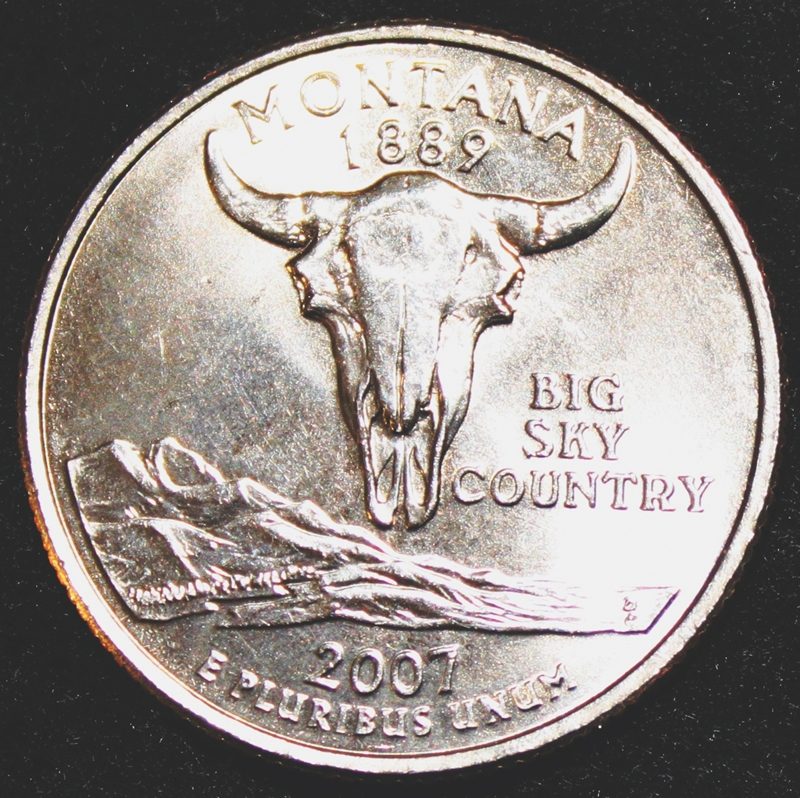By SUZANNE WARING
Montanans are proud of their state, and they have many nicknames that exemplify that pride.
Most of us know that the state was early on named the “Treasure State” because Montana produced precious metals, such as copper, gold, and silver. This popular name adorned Montana’s vehicular license plates from 1950 to 1966. In 2010 the nickname, “Treasure State” was reintroduced to license plates. Along the same vein is the less common nickname, “Bonanza State.” It is said that the nickname was coined by Judge John Wasson Eddy, who was referring to the many bonanza mines in the state at the time.
In 1947, A. B. Guthrie, Jr., from Choteau, published his first major book with a setting in the West. It was titled The Big Sky, a reference to looking up and seeing what seemed like an unobstructed sky going on forever. Sinking to the inner core of all of those who heard the nickname, Montanans loved calling the state the “Big Sky Country.”
In 1962, Guthrie gave the Montana Highway Department permission to use the name in its promotions. The term was used on Montana license plates from 1967 to 1976. In 1976 the term on the plates was shortened to “Big Sky.” To its citizens, Montana has been the Big Sky Country every since.
Several other authors took up a name variation in their book titles that also became best sellers. Ivan Doig authored a popular book, titled This House of Sky, and Kirby Larson penned the Newberry Honor Book, Hattie Big Sky.
The “Land of the Shining Mountains” was a name describing the area by Indian tribes and recorded by French explorer, Pierre La Vérendrye. Native Tribes also referred to the Rocky Mountains as “The Shining” because of the snow-capped mountains. In 1895, “Land of the Shining Mountains” was first used in a promotional booklet published by the Montana Bureau of Agriculture, Labor, and Industry.
The motto, “Montana: High Wide and Handsome,” was used as the title of Joseph Kinsey Howard’s history book published in 1943, although he did not create the phrase. It had been used earlier by the Montana Highway Department publicity brochure and possibly coined by C. B. Glasscock, who wrote in his 1935 book, War of the Copper Kings, that “Life in Butte was high, wide and occasionally handsome.”
“The Last Best Place” is a recent nickname for Montana. It is attributed to writer William Kittredge. He gave the title to Montana. The Montana Historical Society used the phrase as the title of an anthology of Montana writers, published in 1988 and edited by William Kittredge and Annick Smith. In 2002, a business man who had a luxury guest ranch in Montana sought to have sole rights to the phrase. In response to an uproar from Montana citizens and lawsuits, Senate and House committees approved language in a Department of Commerce appropriations bill that forbade the registering or enforcing of a trademark of the phrase. Now anyone can use it. Kittredge said his favorite use was a sign in a cemetery near Seeley Lake that is called, “The Last Best Place.”
A rarely-heard nickname, “Stubbed-Toe State,” was thought to be in relationship to the rugged terrain of the state’s western region. The Nickname first appeared in the World Almanac in 1922.
Two of the country’s major water systems originate in Montana’s Rocky Mountains: the Columbia and the Missouri, so the state naturally came by the nickname: “The Headwaters State.”
Other more recent mottos have been “EZ 2 LUV,” “Montana—Unspoiled, Unforgettable,” “The 406” in reference to the statewide telephone area code, and “Montana—Naturally Inviting.”
We’re not finished coining nicknames for our expansive, varied state that is ever reinventing itself. With a million words in the English language, we can easily choose new words that best describe Montana in the 21st Century. MSN
A multifaceted interest in Montana people and their communities keeps Suzanne Waring digging for stories in old newspapers and books.









